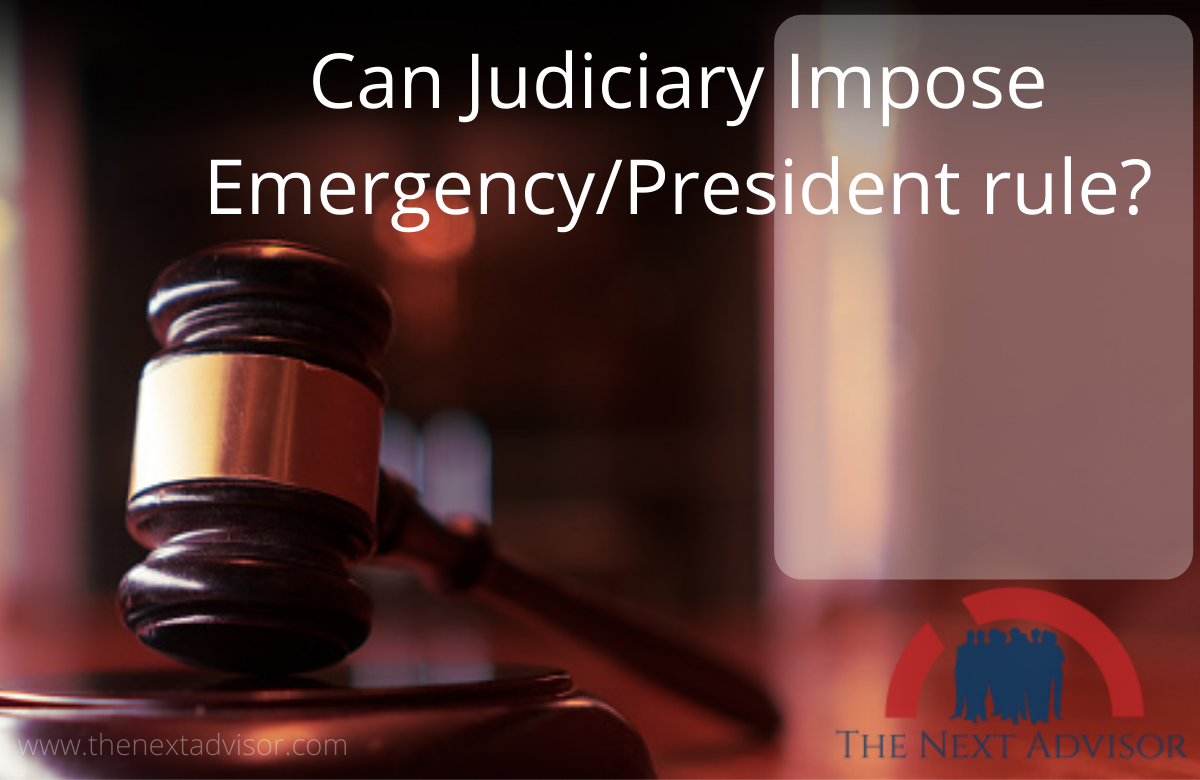Article 356 and an activist judiciary are related to each other. With the help of the State, we can impose Emergency/President rule in the particular State. Can Judiciary Impose Emergency/President rule? is the core question here. One important case is here with respect to Article 356 of the Indian Constitution. What is the role of the Judiciary in the imposition of emergencies in the state? Does this mean the question here is Can Judiciary Impose the Emergency/President rule?
Honorable Supreme Court stays Andhra Pradesh High Court’s “disturbing” order to examine” breakdown of Constitutional machinery” in AP. Andhra Pradesh government represented by solicitor General Tushar Mehta argued that only President is empowered to go into the question of the breakdown of Constitutional machinery under Article 356 and not the judiciary.
Let us see about the Breakdown of Constitutional Machinery
Article 356. Provisions in case of failure of constitutional machinery in State
(1) If the President, on receipt of the report from the Governor of the State or otherwise, is satisfied that a situation has arisen in which the government of the State cannot be carried on in accordance with the provisions of the Constitution, the President may
(a) assume to himself all or any of the functions of the Government of the State.
(b) declare that the powers of the Legislature of the State shall be exercisable by or under the authority of Parliament.
(c) make such incidental and consequential provisions as appear to the president to be necessary or desirable for giving effect to the objects of the Proclamation
Let us see about Article 356.
• India Constitution makers borrowed the provision of Article 356 from the Sec 93 of Government of India Act, 1935. This provision was extensively debated in the constituent assembly.
– Between August 1949 and October 1949, members of the Constituent Assembly debated the Draft Constitution’s emergency provisions – Draft Articles 275 to 280A (Articles 352 to 360). ,
let us see about Article 356
Criticism – CA member H.V. Kamath accused the Drafting Committee of plagiarising the United Kingdom’s Emergency Powers Act in a ‘ dishonest fashion ‘. He further added that the provision was ‘ dangerous ‘ and India should do better and not worse than the British government.
– He moved an amendment to delete the word ‘ otherwise ‘ from Article 356.
” This is a foul transaction, setting at naught the scheme of even the limited provincial autonomy which we have provided for in this Constitution, and I shall pray to God that He may grant sufficient wisdom to this House to see the folly, the stupidity, and the criminal nature of this transaction.”
The Defense
– Dr. BR Ambedkar defended Article 356 saying, similar clauses appear in the American Constitution. They also occur in the Australian Constitution where the Constitution, in express terms, provides that it should be the duty of the Central Government to protect the units or the States from external aggression or internal disturbance.
He hoped that Article 356 will lead to the fulfillment of the duty and obligation of the center to protect provinces. He hoped that the use of Article 356 would not be wanton, arbitrary, and unauthorized. In fact, B.R. Ambedkar had assured that Article 356 would remain a dead letter.
Dead letter to Deadly Weapon
Article 356 has been the most misused article in India. Instead of being a dead letter as envisaged by Ambedkar, it has become a deadly weapon. , It has been used/misused more than 130 times.
Note: Even JL Nehru govt used it multiple times. Indira Gandhi govt used it as many as 27 times. – From 1971 to 1984, it was used 59 times In all INC governments have used it 93 times to dismiss state governments.
Is Judiciary the savior against Article 356?
SR Bommai case 1994 – President’s rule imposed will be open to Judicial review On what basis is the proclamation based? Is there mala fide use of power?
– Center should give a warning to the state
– The majority enjoyed by the Council of Ministers shall be tested only on the floor of the House.
Let us get back to the case – Irony Alert Is Judiciary really the savior? –
In Reddi Govinda Rao v The State of Andhra Pradesh and others ( 14 other habeas corpus petitions clubbed ) which alleged police excesses in Andhra Pradesh, the High Court on October 1, 2020, asked the State advocate general to come prepared to ” assist the court as to whether In circumstances, which are prevailing in the State of Andhra Pradesh, the court can record a finding that there is the constitutional breakdown in the State or not “.
The Core Question- Can Judiciary Impose Emergency/President rule under Article 356? = YES
Article 356. Provisions in case of failure of constitutional machinery in State
(1) If the President, on receipt of a report from the Governor of the State or otherwise is satisfied that a situation has arisen in which the government of the State cannot be carried on In accordance with the provisions of the Constitution, the President may proclaim State emergency.
Dubious record of Judiciary
Failure of Constitutional Machinery in a State: What the Courts Can and Can’t Do While staying the Andhra Pradesh HC’s order seeking to examine this issue i.e., Can Judiciary Impose Emergency/President rule?, the Supreme Court failed to note that it too had passed a similar observation in 2007. Even before that, in 1997, a Patna High Court Bench held that HC could also report to the President about the breakdown of constitutional machinery in the State.





















